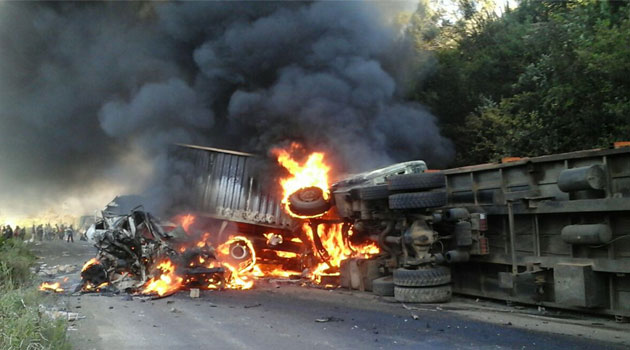The Lagos State Government on Sunday said a combination of vehicular defect and human errors were responsible for the Thursday tanker fire on Otedola Bridge end of the Lagos-Ibadan Expressway, which led to the death of 10 persons and destruction of 54 vehicles.
The government said it had taken some measures to prevent a recurrence, adding that it had restricted movement of fuel tankers to trailer route.
The state also said it was now mandatory for all articulated trucks coming into Lagos to obtain the Ministry of Transportation’s Road Worthiness Certificate.
At a joint press briefing in Alausa after meeting with all the relevant stakeholders, the Commissioner for Transportation, Mr Ladi Lawanson, said, “The decision became necessary following preliminary investigations into the incident which revealed a combination of vehicular defect and human errors.”
Among the stakeholders at the meeting were the Nigeria Union of Petroleum and Natural Gas Workers, Association of Maritime Truck Owners, Petroleum Tanker Drivers , National Association of Transport Operators and Container Truck Owners Association of Nigeria.
Lawanson added, “As an immediate response to the latest incident, the Lagos State Government hereby announces the following measures: fuel tankers are hereby directed to ply the designated trailer route, that is, Apapa-Oworonshoki Expressway via Ogudu to the Lagos-Ibadan Expressway.
“All tankers and containers coming into Lagos State are directed to obtain the Ministry of Transportation Certificate of Road Worthiness at any of our centres within the next 30 days, while new centres along the Lagos-Ibadan Expressway will be established to quickly to cope with the expected demand for this service.”
Lawanson explained that the tanker which exploded was registered in the Nasarawa Local Government Area, Kano State, with number plate, NSR 888 YC, and had changed ownership 13 times since purchase.
“It (the tanker) was manufactured in 1999 by Mack Trucks Inc at its assembly plant in Winnsboro, United States. This truck was designed as a 14,959kg (approximately 15 tonnes) drilling rig with low bed, but it was converted in Nigeria from a drilling rig to a fuel tank carrier to carry 30 tonnes.
“From this preliminary investigation, the truck should not have been loaded to the weight of 30 tonnes, which is twice its pulling capacity,” the commissioner said.
The commissioner said the government deliberated on restriction of the operation of tankers to certain hours, adding that it was decided that such would undermine supplies and threaten the wellbeing of the Nigerian economy “since there is high demand for petroleum products across the country.”
“We believe that ensuring unhindered supply of petroleum products is indeed a patriotic contribution by Lagos State to the nation’s economic survival,” Lawanson added.
He, however, said the government was exploring alternative modes of transportation of petroleum products to separate passenger traffic from cargo movements within the metropolis in the interest of public safety.
He also said the government, in partnership with all the stakeholders, would set up joint-enforcement of the operating laws, while barriers would be installed on bridges in Lagos, including Ojuelegba, Mobolaji Bank Anthony, Ekodeso, Abule-Egba and Lekki-Ajah, to prevent articulated trucks from using them.
The Commissioner for Special Duties and Intergovernmental Relations, Mr Seye Oladejo, confirmed that one of the injured persons had died, while the government had taken full responsibility for the treatment of others.
He said the victims were only taken to the Lagos State University Teaching Hospital, Ikeja, and Burns and Trauma Centre in Gbagada.
“Altogether, nine people passed on at the scene of the incident and they were all burnt beyond recognition. We have set up a helpline at LASEMA to open a communication channel with members of the public and with family members of the victims. It is important that DNA is conducted; otherwise we will end up giving the wrong bodies to some families and that would become another issue entirely.
“This kind of situation really calls for patience and understanding on the part of members of the public, especially families of victims. As much as we commiserate, things still have to be done professionally,” Oladejo added.
He faulted the insinuations that the integrity of Otedola Bridge had been compromised, saying such were baseless. He added that the government would soon fix the damaged section of the bridge.







